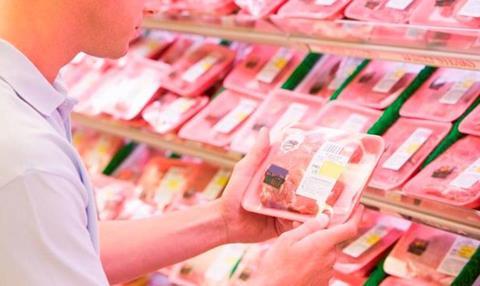The meat industry has responded to a new study that alleges daily meat consumption in the UK has fallen by 17% in the last decade.

The report, published in the journal the Lancet Planetary Health, used data from the National Diet and Nutrition Survey, which included a study of the dietary habits of more than 15,000 people across the UK.
“Meat should be part of a healthy balanced diet”
Nick Allen, chief executive of the British Meat Processors Association (BMPA), said: “The new study paints an interesting picture of the patterns of meat consumption in the UK. It shows that the groups who have traditionally eaten the most meat have moderated their intake, while the youngest cohort who were born since 1999 and belong to Generation Z have actually increased their intake.”
Allen stated that the study’s findings “fit in with current dietary advice that meat should be part of a healthy balanced diet.” He continued: “But we’d also add an extra layer to this. Here in the UK, we produce highly nutritious meat to some of the highest environmental and welfare standards on the planet. That means British consumers can follow the ‘less but better’ mantra by choosing to buy British.
“On the environmental side, a lot of work is underway to develop new methods to reduce methane output from cows and sheep. We find it very encouraging that one of the National Food Strategy recommendations states that ‘Investing in these technologies offers our best hope of decarbonising livestock farming without massively reducing the number of farms in the sector and the amount of meat we can eat’.”
Allen stated that BMPA also support the recommendation in the National Food Strategy that calls for part of the existing £280 million Defra fund to go towards developing the technologies further.
"We must recognise its sustainability and dense nutritional value"
The BBC’s news coverage on the study’s findings cited Henry Dimbleby’s National Food Strategy as part of the wider discussion around the reduction of meat consumption within the UK today. The Strategy, commissioned by the Government in 2019, set out recommendations to build what it says could be an improved food system for a healthier nation. The plan recommended that the national diet by 2032 includes (compared to 2019) 30% less meat.
At the time of its publication in July, the industry vocalised concern around the Strategy’s handling of the distinction between the grass-fed British meat and imported meat. National Farmers’ Union (NFU) president Minette Batters said at the time: “We should be considering British meat in its own category, recognising its sustainability and dense nutritional value. After all, scientific and medical communities agree it is a key part of a healthy, balanced diet, chock full of essential vitamins and minerals.”
"Livestock production supports biodiversity"
Responding to the BBC’s handling of the Lancet report, Tony Goodger, a spokesperson for the Association of Independent Meat Suppliers (AIMS), said: “As ever the BBC have mixed a cocktail of global impact along with an ignorance of UK production to create a bit of a media story. The opening sentence of the Lancet Planetary Health Report says:
‘Meat production is one of the largest contributors to global warming and environmental degradation. The livestock sector is responsible for about 15% of anthropogenic greenhouse-gas emissions (GHGE), while also driving deforestation, land degradation, and biodiversity loss.’
“Not here in the UK it isn’t. In fact as we all know livestock production takes the natural assets of grass land and rain to produce edible protein whilst supporting biodiversity and it is shameful though I suggest unsurprising that a BBC reporter hasn’t challenged the report’s statement.”
Goodger continued: “It is always disappointing to see that the chair of the FSA, Professor Susan Jebb, is one of the authors of the Lancet Planetary Health report and I do wonder if she isn’t trying to wear two hats at once and finding that neither really suit.
“Of course one of the most amusing pieces in the BBC report was this from a Dr Christina Stewart, a lead researcher at the University of Oxford who opines: ‘So, for example, if you're at a restaurant, you often see a vegetarian options 'box of shame' at the bottom of the menu rather than at the top with chef's specials.’
“A quick look at Oxfordshire’s most famous restaurant Le Manoir Au Quat’ Seasons shows the contrary with Vegetarian dishes prominently placed across the menus and even the menu from the Oxford Food Guides Top 10 restaurants don’t follow her hypothesis. Maybe research at the University of Oxford isn’t what it used to be?”
This story was originally published on a previous version of the Meat Management website and so there may be some missing images and formatting issues.












